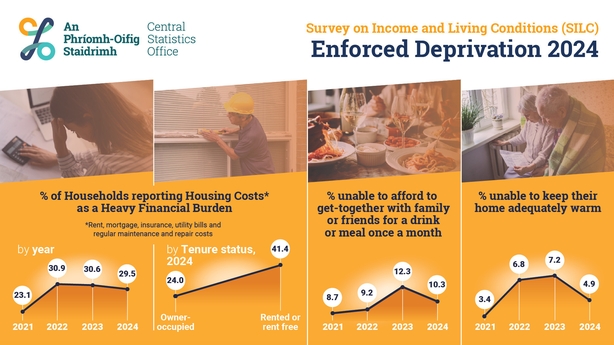New figures from the Central Statistics Office show that the percentage of people living in enforced deprivation decreased from 17.3% in 2023 to 15.7% in 2024.
People are defined as experiencing enforced deprivation if they live in a household that cannot afford two or more of the 11 basic deprivation items that are considered to be the norm for other households in society.
These include being unable to afford to a get-together with family or friends for a drink or meal once a month, being unable to afford to keep their home adequately warm or unable to afford two pairs of properly fitting shoes in good condition that are suitable for daily activities.
The CSO said the groups most likely to experience enforced deprivation in 2024 were those living in single-adult households with children under 18 (46.3%); unable to work due to long-standing health problems (38.5%); unemployed (37.8%); and those living in rented or rent-free accommodation (31.5%).
Today's figures show the percentage of people unable to afford to keep their home adequately warm dropped from 7.2% in 2023 to 4.9% last year, while the percentage of people who were unable to afford new (not second-hand clothes) went down from 8.1% to 6.2%.
Meanwhile, the percentage of households last year that regarded housing costs as a heavy financial burden was down on the 2023 rate, falling to 29.5% from 30.6%.
10.7% of rented households also said they had great difficulty in making ends meet last year compared with 3.2% of owner-occupied households.
Today's CSO figures also show that 51.7% of households had adequate savings to maintain the same standard of living for at least three months.

Meanwhile, the percentage of households last year that regarded housing costs as a heavy financial burden was down on the 2023 rate, falling to 29.5% from 30.6%.
10.7% of rented households also said they had great difficulty in making ends meet last year compared with 3.2% of owner-occupied households.
Today's CSO figures also show that 51.7% of households had adequate savings to maintain the same standard of living for at least three months.
At the end of a typical month, 55.8% of households said they could put money aside, 5.5% needed to draw from savings, and 3.1% needed to borrow money.

